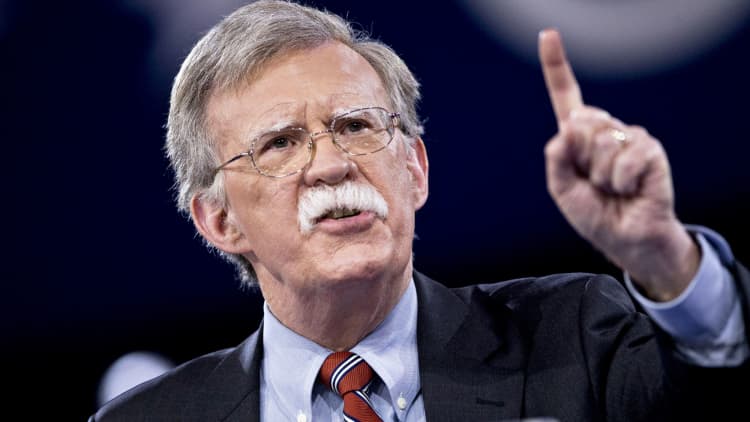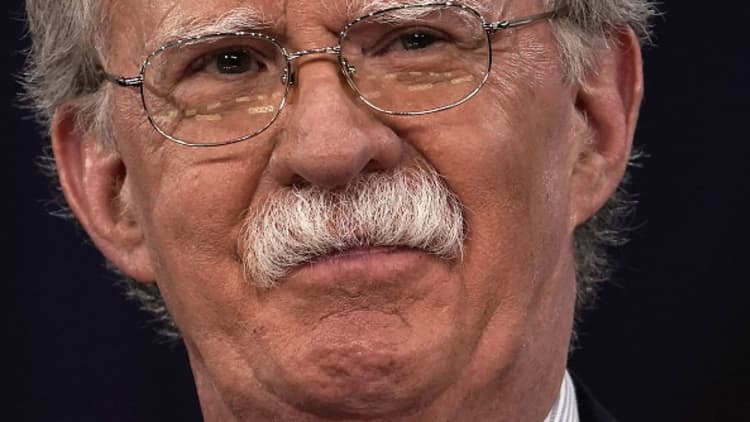
Since joining the Trump administration after a four-decade-long military career, Secretary of Defense James Mattis will face one of his toughest challenges yet: John Bolton.
Bolton, a former United Nations ambassador under President George W. Bush, will take over as President Donald Trump's national security advisor in two weeks. When he arrives at the White House on April 9, Bolton will have less than two months to help coordinate an unprecedented meeting between Trump and North Korean leader Kim Jong Un.
And Bolton's appointment came just weeks after he published an op-ed in The Wall Street Journal titled "The Legal Case for Striking North Korea First."
Bolton's fiery approach to foreign policy, which has also included calls for a pre-emptive strike on Iran, presents a dramatic contrast to Mattis' style, which is seen as more deliberate and diplomatic. Mattis, a retired Marine general, often collaborated on policy issues with Rex Tillerson, who had also favored a more diplomatic approach to foreign policy, before Trump fired him as secretary of State.

Mattis also told colleagues that he thinks it would be hard to work with Bolton, The New York Times reported last week, citing sources.
Now Mattis finds himself isolated as Trump's national security and foreign policy team becomes increasingly hawkish with the addition of Bolton and CIA Director Mike Pompeo being designated Tillerson's replacement at the State Department.
Representatives for Bolton, the White House military office and the Pentagon did not immediately respond to CNBC's request for comment.
Trump's third national security advisor
Bolton will be the third national security advisor to serve Trump, following the departures of three-star Army generals Michael Flynn and H.R. McMaster. Trump has said he fired Flynn for lying to the FBI and Vice President Mike Pence about his contacts with foreign officials, while the president was reportedly frustrated with McMaster's detailed reports on national security matters.
Bolton will be responsible for advising Trump on a wide spectrum of issues, from the U.S.-led coalition against the Islamic State to China's aggressive actions in the South China Sea to North Korea's growing nuclear threat.
The post, which does not require Senate confirmation, comes with a staff of several hundred specialists from the Pentagon, State Department and U.S. intelligence agencies.
A key part of Bolton's portfolio will be supplying guidance for the potential summit between Trump and Kim Jong Un, which would be the first time a sitting U.S. president meets face-to-face with a North Korean leader.
Yet one month before Trump's on-the-spot acceptance to meet with Kim, Bolton made a case for making pre-emptive strikes against the North in his Wall Street Journal op-ed.
"Given the gaps in U.S. intelligence about North Korea, we should not wait until the very last minute. That would risk striking after the North has deliverable nuclear weapons, a much more dangerous situation," Bolton wrote.
The diplomacy question
Stances like this one have made the incoming national security advisor a target of criticism in foreign-policy and national-security circles.
"If you take his advice and attack North Korea, and if you take his advice and change the regime in Iran, I mean, my goodness, if you thought Iraq was bad, this is like 10 times that," retired U.S. Army Lt. Col. Daniel Davis, a senior defense fellow for Defense Priorities, told CNBC in regards to Bolton's op-eds.
"Bolton doesn't even talk about diplomacy. For him, it's either abject surrender on the opposition or it's war, and there doesn't seem to be any room for negotiation," said Davis, who also wrote an opinion piece on Bolton's appointment for CNBC.
His tough talk on North Korea isn't anything new. In 2003, on the eve of six-nation talks over Pyongyang's nuclear program, Bolton called then-North Korean leader Kim Jong II a "tyrannical dictator." The North responded by calling Bolton "human scum."
The invitation from the North for talks comes after the reclusive state spent much of 2017 perfecting its missile arsenal.
Under third-generation leader Kim Jong Un, the North conducted its most powerful nuclear test, launched its first-ever intercontinental ballistic missile and threatened to send missiles into the waters near the U.S. territory of Guam. What's more, the acceleration and frequency of testing show not only Kim's nuclear ambitions but also that the nation has developed an arsenal.
What it means for Mattis
Bolton's appointment came nine days after Trump announced via Twitter that Pompeo would replace Tillerson.
"I suspect that [Mattis has] been really drained by this shuffle, and I don't know if he is going to get along with Pompeo the way he did with Tillerson," Davis said.
Yet, Davis noted that while the appointments of Pompeo and Bolton will be a challenge for Mattis, it is unlikely that he will leave the administration anytime soon.
"Even if he wanted to leave, I think his sense of duty would say well I'm going to stick around for another 6 months, 9 months, a year," Davis said.
And while it is unclear what Tillerson's exit means for other top Cabinet officials, the retired four-star general in charge of the Pentagon undoubtedly lost an ally.
The venerated Marine commander forged a close alliance with the former Exxon Mobil CEO largely due to their diplomatic approach to national security matters.
Mattis and Tillerson successfully bridged what has historically been a contentious relationship between the Pentagon and State. The two often coordinated their positions and presented a unified policy front to the White House.
On Jan. 19, Mattis unveiled the National Defense Strategy at Johns Hopkins' School of Advanced International Studies in Washington. During his speech, Mattis emphasized the importance of partnering with Tillerson to craft the administration's national security road map.
"It starts with me having breakfast every week with Secretary of State Tillerson," Mattis said in January. "We talk two, three times a day, sometimes. We settle all of our issues between he and I, and then we walk together into the White House meetings. That way, State and Defense are together."
Those days have come to an end.
WATCH: Bolton will advocate hardline policies



